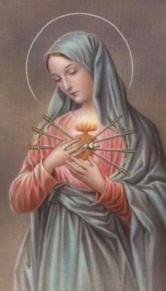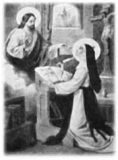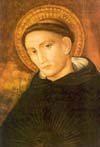May & June 2006
Dear Prayer Warriors,
Anointing of the Sick
The anointing of the sick is administered to bring spiritual and even physical strength during an illness, especially near the time of death. It is most likely one of the last sacraments we will receive. A sacrament is an outward sign established by Jesus Christ to confer inward grace. In more basic terms, it is a rite that is performed to convey God’s grace to the recipient, through the power of the Holy Spirit.
The Catholic Church teaches that the Sacred Anointing of the Sick is one of the seven Sacraments of the New Testament, that it was instituted by Christ and that it is "alluded to in Mark (Mk. 6:13) and recommended to the faithful by James the Apostle.
The anointing of the sick conveys several graces and imparts gifts of strengthening in the Holy Spirit against anxiety, discouragement, and temptation, and conveys peace and fortitude (CCC 1520). These graces flow from the atoning death of Jesus Christ, for "this was to fulfill what was spoken by the prophet Isaiah, ‘He took our infirmities and bore our diseases’" (Matt. 8:17).
In his steadfast love for us, the Lord gives us the sacraments to comfort us in our final days and prepare us for the journey ahead. These include penance (or confession), anointing of the sick and Viaticum (which is meant to be the last reception of Communion for the journey from this life to eternity). How many may have only skimmed the upper reaches of Purgatory had they received the anointing of the sick when dying.
Does a person have to be dying to receive this sacrament? No. The Catechism says, "The anointing of the sick is not a sacrament for those only who are at the point of death. Hence, as soon as anyone of the faithful begins to be in danger of death from sickness or old age, the fitting time for him to receive this sacrament has certainly already arrived" (CCC 1514). It can also be given just prior to a serious operation. The anointing can also be given repeatedly to someone if his/her condition becomes worse as well as for the elderly whose frailty becomes worse.
Therefore we have the sacrament of the Anointing of the Sick. It gives us graces as strengthening, peace and courage to overcome the difficulties that are associated with disease, illness and dying. It is a gift of the Holy Spirit. It also creates a union with the Passion of Christ. Just as Christ suffered and was glorified, we also receive grace through suffering, a consequence of original sin, so that there is healing of the soul.
Like almost all sacraments bishops and priests are the ordinary ministers. The faithful are encouraged to call upon a priest to perform this sacrament when it is known that someone is sick and/or dying. The priest or bishop will pray in silence and then anoint the sick person with oil. The sacramental act begins with the priest administering a short rite of penance, signifying forgiveness and reconciliation. This is followed by a reading. Then, in silence, the priest lays his hands on the sick person, and anoints the forehead and palms with oil, saying:
‘Is anyone sick among you? Let him bring in the priests of the Church; And let them pray over him, Anointing him with oil in the name of the Lord And the prayer of faith will save the sick man; And the Lord will raise him up; And if he has committed sins he will be forgiven’ (James 5:14-15)
Why it is important to call for a priest to administer the
Sacrament of Anointing of the Sick to a loved one who is near death
1. The sacrament of the Anointing of the Sick takes away all mortal and venial sins, even if the person is unconscious. To hear the person's last confession and to provide them with the Viaticum (Holy Eucharist), prepares them for their journey to Our Lord. In addition, the apostolic pardon takes away any temporal punishment (purgatory time) that remains for the soul.
Apostolic Pardon: (to be given by a priest only): " By the authority granted me by the Holy See, I hereby grant you full pardon and remission of all your sins: In the Name of the Father + and of the Son and of the Holy Spirit. Amen."
2. The devil at the time of death tempts the soul to despair by accusing it of its sins. Among other reasons, Our Lord instituted the Chaplet of Divine Mercy to drive him away at this time.
3. To restore the dying person to health. Although this is not a primary reason for the last sacrament, God sometimes allows a dying person to become fully recovered after receiving this sacrament, when the healing of the body is of spiritual benefit to the soul.
4. To save the soul of a person who is estranged from God by being in an unrepentant state of mortal sin. A dying person can become repentant as a result of prayers from his family, especially the recitation of the Divine Mercy Chaplet.
5. To give the dying person the courage and strength to withstand their sufferings, knowing that they are fully prepared to meet Our Divine Savior.
If a person is unconscious or even dead should you call the priest? Yes! The priest will administer a conditional anointing which will take away all mortal and venial sins, and if he gives the apostolic pardon, all purgatory time will be removed.
Theologians differ as to when exactly the soul departs. Many teach that the soul remains for several hours in the vicinity of its body and can be conditionally anointed and given the apostolic pardon during this time.
The proper time for receiving this holy anointing has certainly arrived when the believer begins to be in danger of death because of illness or old age. The celebration of the Anointing of the Sick consists essentially in the anointing of the forehead and hands of the sick person (in the Roman Rite) or of other parts of the body (in the Eastern rite), the anointing being accompanied by the liturgical prayer of the celebrant asking for the special grace
of this sacrament. The special grace of the sacrament of the Anointing of the Sick has as its effects:
the uniting of the sick person to the passion of Christ, for his own good and that of the whole Church;
the strengthening, peace, and courage to endure in a Christian manner the sufferings of illness or old age;
the forgiveness of sins, if the sick person was not able to obtain it through the sacrament of Reconciliation;
the restoration of health, if it is conducive to the salvation of their soul; and the preparation of passing over to eternal life.
Through the Sacrament of the Anointing of the Sick we are assured that God will raise us up, like Jesus, from our bed of pain and sickness and lead us to eternal life. Through it we are comforted when we feel most abandoned.
GLORIOUS CROSS
I adore You, O glorious Cross, which was adorned with the Heart and Body of my Savior Jesus Christ, stained and covered with blood. I adore You, O Holy Cross, out of love for Him, Jesus, who is my Savior and my God.
Pope Pius IX declared that reciting this prayer five times on Friday will free five souls from Purgatory and 33 souls by reciting it on Good Friday. This prayer should be recited before a crucifix with a contrite heart and praying a few minutes for the Pope.
News from the Central Office
Thank you for all the newspaper clippings from the Obituary page as well as lists of those who are deceased. We have enrolled all the names you sent in the Golden Book and a mass will be said every Friday throughout the year in the Missions for all those enrolled in the Golden Book.
We ask that you continue to pray “for all those enrolled in the Golden Book” and offer masses for your living and deceased friends and relatives whenever you are able.
As you have read from the message above, it is important to have the anointing of the sick for yourself as well as a dear friend or relative when necessary.. Advise your children or close relatives of your wishes when you are ill. Tell them of the importance of having a priest come to your bedside and anoint you. Also teach them the importance of having masses said for both the living and the dead. Your reward will be great in Heaven and the Souls you helped release from Purgatory will be there to welcome you and plead for you before our Lord and Judge.
Easter Blessings to all of you!
Friends of the Poor Souls








1 Comments:
Enfermos y difuntos en León
Personas dispuestas a ayudarle a atender sus problemáticas y buscar las mejores soluciones en ayudas para enfermos y difuntos en León
to get more - https://rbhglobalsoluciones.es/enfermos-difuntos-leon/
Post a Comment
<< Home